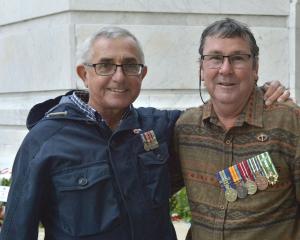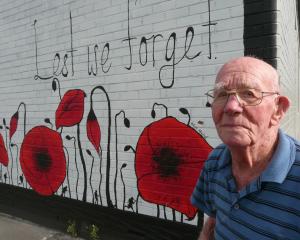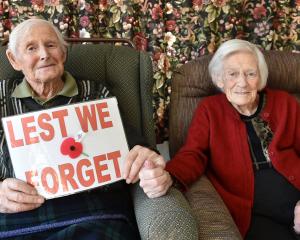
You can imagine Jack Thurlow thinking what a strange thing war is. It is April 24, 1941.
The previous year he was driving a New Zealand Railways Road Services bus around Balclutha, Kaitangata, and Clinton.
Now Driver Thurlow, 4 Reserve Mechanical Transport Company, is in Athens, at the port of Piraeus, in the smoking lounge of Hellas - once a luxury vessel commissioned by US tycoon William Vanderbilt, now a Greek ferry.
However, this is no pleasure cruise.
Hellas is crammed with more than 1000 people fleeing the advancing German army: civilians, wounded British and Australian soldiers, the 4RMT, and 75 strays from the Maori Battalion, all seeking safety.
However this day - Anzac Day back home - Piraeus is not a safe place.
Hellas had arrived that morning, unexpectedly, offering its services to the evacuation.
It was ordered to wait for nightfall, then sail for Egypt. In the meantime most of the crew vanished.
Any sailor aboard was pressed to get Hellas ready, but around 7pm - before the protective cloak of darkness - German Stuka dive-bombers swarmed down on the ship.
With guns mounted at the front and rear of the vessel, Hellas was a legitimate target for German pilots.
Within minutes around half the people aboard - including Dvr Thurlow - were dead.

John Shaw Walter Thurlow - Jack to all - was born in Oamaru in August 1906, to William and Annie Thurlow.
He trained as a mechanic in Dunedin before a job with Balclutha bus firm Tweedies took him to Kaitangata.
A keen cricket and rugby player, he was president of Crescent Rugby Football Club from 1932-34 and became a local, marrying Kaitangata girl Constance Clements.
The couple moved to Kaka Point, where eldest boy Ian was born, before Jack joined the New Zealand Railway Road Services, in Clinton. By this time Ian had a younger brother, Kenneth.
However, events further afield dictated Jack Thurlow follow roads other than the Owaka Highway.
Dvr Thurlow enlisted for service in World War 2, trained at Trentham in 1940, and the following year was shipped to Greece with 4RMT.
While 4RMT was nominally a reserve company, with the Germans sweeping all before them, it was in the front line.
The official history describes the weeks in Greece as a ``cat-and-mouse'' life, spent dodging dive bombers and fighter planes, with drivers abandoning trucks and diving for cover.
In early April, Dvr Thurlow was in Larissa, where he wrote the final letter Connie was to receive from him.
By April 19, Dvr Thurlow and the workshops section of 4RMT were in Athens, trying to get stranded vehicles running.
They got 80% of them back into service, but were then ordered to render them unusable to the enemy and prepare to leave.
On the afternoon of April 24, Dvr Thurlow and the 4RMT headed for Piraeus, and Hellas.
``In a few minutes flames seemed to be everywhere,'' the 4RMT official history says.
``Surrounded by the wounded, the dead, and the panic-stricken, Staff Sergeants Wilson and Cooney worked valiantly in a race against the fires, quietly organising rescue parties to sort the wounded from the dead.''
Years later, Ian Thurlow heard the story from a 4RMT survivor who was with his father just before he died.
``Harry Hills was with him in the saloon when he was called away to assist with the ship's navigation,'' Mr Thurlow said.
``Old Harry, who was on the bridge at the time of the air attack and swam ashore, gave me an insight into the conditions aboard
``She was extremely overloaded and when bombed was built to burn, with all the lacquered woodwork and such.
``There was no firefighting equipment, as her fire pumps would have been steam powered and her boilers were probably down also.''
Not that young Ian - just 5 - or his family, or the army, knew this.
In the confusion of the Allied retreat from Greece, no-one was taking meticulous records.
Either through mistake or optimism, Dvr Thurlow was listed as a prisoner of war. The Otago Daily Times published the official notification.
It was not a forlorn hope - 52 men from 4RMT were captured in Greece.
In Kenmure Rd, Dunedin, Jack's widowed mother waited for news, as did Connie, Ian and Kenneth in Main St, Clinton.
It was slow in coming and it was not glad tidings. By February 16 the following year it was noted on Dvr Thurlow's service file ``Evidence to hand, may be presumed K in A''.
Dvr Thurlow was not meant to have an illustrious war, but in the mechanical reserve he should have at least had a relatively uneventful one.
However, war does not respect ``meant to'' or ``should have'', and Clinton lost a man who the Otago Daily Times reported was well-known as a passenger bus driver, and who would be greatly missed from the local football fields.
Connie Thurlow lost a husband, Ian and Kenneth Thurlow lost a dad, Anne Thurlow lost a son.
Anne died in 1949 and is buried alongside her husband Walter, in Andersons Bay Cemetery.
Connie and the boys moved to Balclutha to be closer to family. There she met Charlie Steele, a former butcher and first echelon soldier medically discharged and then manpowered to work at Finegand freezing works.
The couple married in 1945 and moved to Auckland, Mr Steele's home town. He died in 1976, while Connie died in 2002, aged 90.
Ian Thurlow served an apprenticeship as a fitter at Hillside Workshops, then went sea.
After a varied career, he worked for 20 years at Tasman Pulp and Paper, before retiring to Papamoa.
Kenneth followed his stepfather into the meat trade, ending up the wholesale manager for Wilson Meats, before retiring to Cooks Beach, near Whitianga.
Although the brothers have dim memories of their father, Jack Thurlow is not forgotten.
His name is on the memorial to those who died aboard Hellas, and both the boys have visited the site in Greece where their lives were changed forever one Anzac Day morning.












